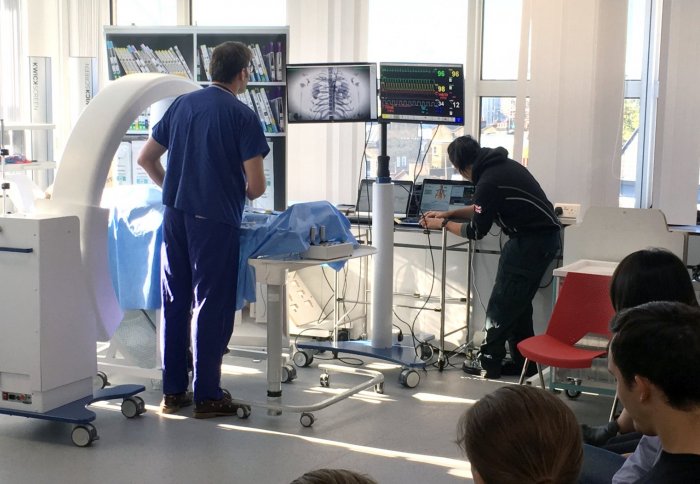Gaining an insight into today's healthcare challenges with Sequential Simulation
by Duncan Boak

The students watch a simulation of a coronary angioplasty performed in 'SimCath', ICCESS' simulated cath lab.
MSc International Health Management students learn about the power of simulation during a visit to the Centre for Engagement and Simulation Science
The opportunity to gain first-hand insight into the challenges within the UK healthcare system might not be something that’s readily available outside Imperial College, and a group of newly enrolled students on the MSc International Health Management programme took full advantage when they visited the Centre for Engagement and Simulation Science (ICCESS) on 6th October.
The students watched a Sequential Simulation of a patient visiting hospital following a heart attack and undergoing a coronary angioplasty. The ICCESS team designed the simulation to show interactions between patients and clinicians in difficult circumstances; in this case due to a shortage of nursing staff. The student cohort, many of whom are from outside the UK and have no previous experience of the UK healthcare system, then worked in groups to discuss the challenges presented in the simulation and how things could be improved.
The immersive experience provided the students with a great introduction to some of the topics they’ll cover in their programme of study. Dr Benita Cox, who leads the programme, appreciates the experiential learning that simulation provides: ‘Observing the simulation helps our students to understand the challenges and complexity of a clinical scenario. It also enables them to consider how they might apply management principles to facilitate and improve the clinical pathway process.’
For more information on the MSc International Health Management programme visit: http://www.imperial.ac.uk/study/pg/business-school/international-health-management/
If you think that Sequential Simulation could add value to your academic programme and would like to find out more, please contact ICCESS Centre Manager Duncan Boak at D.Boak@imperial.ac.uk
Article text (excluding photos or graphics) © Imperial College London.
Photos and graphics subject to third party copyright used with permission or © Imperial College London.
Reporter
Duncan Boak
Department of Surgery & Cancer